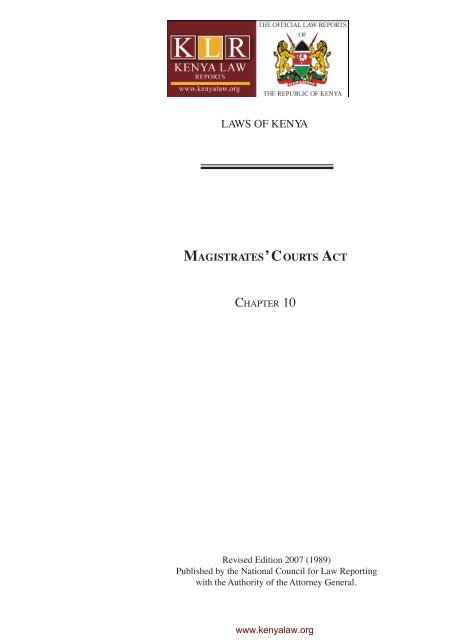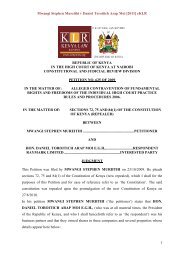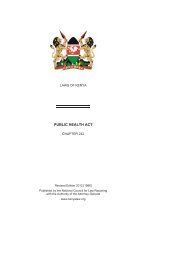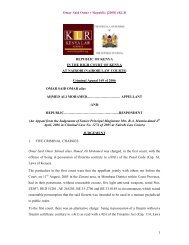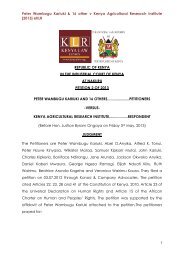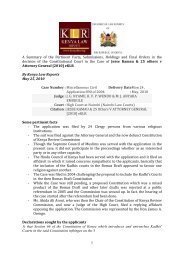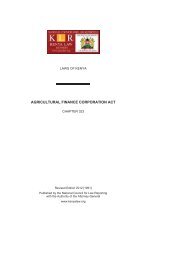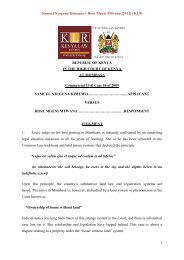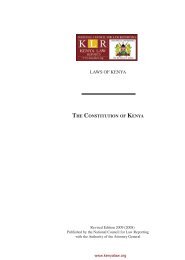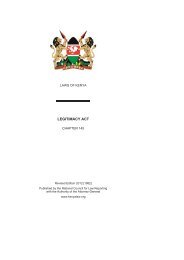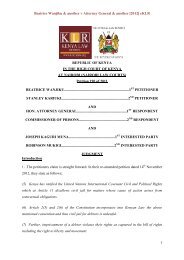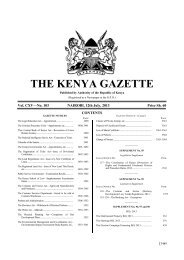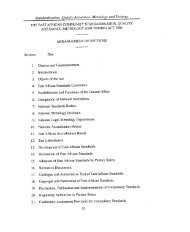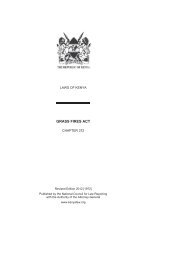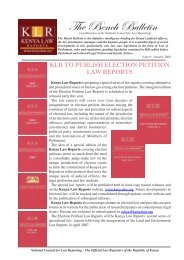Magistrates' Courts Act - Kenya Law Reports
Magistrates' Courts Act - Kenya Law Reports
Magistrates' Courts Act - Kenya Law Reports
You also want an ePaper? Increase the reach of your titles
YUMPU automatically turns print PDFs into web optimized ePapers that Google loves.
LAWS OF KENYA<br />
MAGISTRATES’ COURTS ACT<br />
CHAPTER 10<br />
Revised Edition 2007 (1989)<br />
Published by the National Council for <strong>Law</strong> Reporting<br />
with the Authority of the Attorney General.<br />
www.kenyalaw.org
Section<br />
1 – Short title.<br />
2 – Interpretation.<br />
Magistrates’ <strong>Courts</strong> <strong>Act</strong> Cap 10<br />
CHAPTER 10<br />
THE MAGISTRATES’ COURTS ACT<br />
ARRANGEMENT OF SECTIONS<br />
part I – preLIMINarY<br />
part II – reSIDeNt MaGIStrate’S COUrt<br />
3 – Establishment of Resident Magistrate’s Court.<br />
4 – Criminal jurisdiction of Resident Magistrate’s Court.<br />
5 – Civil jurisdiction of Resident Magistrate’s Court.<br />
part III – DIStrICt MaGIStrateS’ COUrtS<br />
6 – Powers of district magistrate.<br />
7 – Establishment of district magistrates’ courts.<br />
8 – Criminal jurisdiction of district magistrate’s court.<br />
9 – Civil jurisdiction of district magistrate’s court.<br />
part IIIa – JUrISDICtION IN CertaIN CaSeS reLatING tO LaND<br />
9A –<br />
9B –<br />
9C – Repealed.<br />
9D –<br />
9E –<br />
9F –<br />
part IV – appeaLS FrOM CertaIN DIStrICt MaGIStrateS’ COUrtS<br />
10 – Appeal from certain district magistrates’ courts in criminal matters.<br />
11 – Appeal from certain district magistrates’ courts in civil matters.<br />
12 – Powers of court on appeal.<br />
part V – GeNeraL<br />
13 – Places and times of sitting and distribution of business.<br />
14 – Attorney – General’s power to determine place of sitting.<br />
15 – Procedure and practice.<br />
16 – Rules of court.<br />
17 – Evidence of customary law.<br />
18 – Records and returns.<br />
19 – Supervision of courts.<br />
20 – Seals and stamps.<br />
www.kenyalaw.org
Magistrates’ <strong>Courts</strong> <strong>Act</strong> Cap 10<br />
CHAPTER 10<br />
THE MAGISTRATES’ COURTS ACT<br />
Commencement: 1st August, 1967<br />
An <strong>Act</strong> of Parliament to establish magistrates’ courts; to declare the<br />
jurisdiction and provide for the procedure of such courts; to provide<br />
for appeals in certain cases; and for purposes connected therewith<br />
or incidental thereto<br />
part 1 - preLIMINarY<br />
1. This <strong>Act</strong> may be cited as the Magistrates’ <strong>Courts</strong> <strong>Act</strong>.<br />
. In this <strong>Act</strong>, unless the context otherwise requires -<br />
“claim under customary law” means a claim concerning any of<br />
the following matters under African customary law -<br />
(a) land held under customary tenure;<br />
(b) marriage, divorce, maintenance or dowry;<br />
(c) seduction or pregnancy of an unmarried woman or girl;<br />
(d) enticement of or adultery with a married woman;<br />
(e) matters affecting status, and in particular the status of<br />
women, widows and children, including guardianship,<br />
custody, adoption and legitimacy;<br />
(f) intestate succession and administration of intestate estates,<br />
so far as not governed by any written law;<br />
“district magistrate’s court” means a court established by section 7;<br />
“Judicial Service Commission” means the commission established<br />
under section 68 of the Constitution;<br />
“magistrate” means a chief magistrate, a senior principal<br />
magistrate, a principal magistrate, a senior resident magistrate, a resident<br />
magistrate or a district magistrate; and each of those terms applies to a<br />
person respectively appointed by the Judicial Service Commission under<br />
section 69 of the Constitution to, or to act in, the particular office;<br />
“magistrate’s court” means the Resident Magistrate’s Court or a<br />
district magistrate’s court;<br />
“magistrate’s court of the first class” means the Resident<br />
Magistrate’s Court, or a district magistrate’s court held by a district<br />
www.kenyalaw.org<br />
17 of 1967,<br />
10 of 1969,<br />
14 of 1972,<br />
4 of 1974,<br />
6 of 1979,<br />
14 of 1981,<br />
11 of 1983,<br />
19 of 1984,<br />
18 of 1986,<br />
20 of 1989,<br />
18 of 1990,<br />
14 of 1991,<br />
11 of 1993,<br />
2 of 2002.<br />
Short title.<br />
Interpretation.<br />
14 of 1972, 9 th Sch.,<br />
4 of 1974, Sch.,<br />
18 of 1986, Sch.<br />
A 14 of 1991, Sch.
Establishment of<br />
Resident Magistrate’s<br />
Court.<br />
4 of 1974, Sch.,<br />
18 of 1986, Sch.<br />
14/1991<br />
Criminal jurisdiction<br />
of Resident<br />
Magistrate’s Court.<br />
Cap. 75.<br />
Civil jurisdiction of<br />
Resident Magistrate’s<br />
Court.<br />
4 of 1974, Sch.,<br />
6 of 1979, Sch.,<br />
11 of 1983, Sch.,<br />
18 of 1986, Sch,<br />
A 14 of 1991, Sch.<br />
11 of 1993, Sch.,<br />
2 of 2002, Sch.<br />
Magistrates’ <strong>Courts</strong> <strong>Act</strong> Cap 10<br />
magistrate having power to hold a magistrate’s court of the first class;<br />
“magistrate’s court of the third class” means a district magistrate’s<br />
court held by a district magistrate having power to hold a magistrate’s<br />
court of the third class;<br />
“order” includes a conviction, a sentence, a decree and any other<br />
decision or determination of a court;<br />
“Resident Magistrate’s Court” means the court established by<br />
section 3.<br />
part II - reSIDeNt MaGIStrate’S COUrt<br />
. (1) There is hereby established the Resident Magistrate’s<br />
Court, which shall be a court subordinate to the High Court and shall<br />
be duly constituted when held by a chief magistrate, a senior principal<br />
magistrate, a principal magistrate, a senior resident magistrate or a<br />
resident magistrate.<br />
(2) The Resident Magistrate’s Court shall have jurisdiction<br />
throughout <strong>Kenya</strong>.<br />
. The Resident Magistrate’s Court shall have and exercise such<br />
jurisdiction and powers in proceedings of a criminal nature as are for<br />
the time being conferred on it by -<br />
(a) the Criminal Procedure Code; or<br />
(b) any other written law.<br />
5. (1) Subject to any other written law the resident magistrate’s<br />
Court shall have and exercise jurisdiction and powers in proceedings<br />
of a civil nature in which the value of the subject matter in dispute does<br />
not exceed one hundred thousand shillings, or three hundred thousand<br />
shillings where the court is held by a principal or a senior resident<br />
magistrate and five hundred thousand shillings where the court is held<br />
by a chief magistrate or a senior principal magistrate:<br />
Provided that the Chief Justice may, by notice in the Gazette,<br />
increase the limit of jurisdiction of-<br />
(a) a chief magistrate to a sum not exceeding three million<br />
shillings;<br />
(b) a senior principal magistrate to a sum not exceeding two<br />
million shillings;<br />
(c) a principal magistrate to a sum not exceeding one million<br />
shillings;<br />
(d) a senior resident magistrate to a sum not exceeding eight<br />
www.kenyalaw.org
Magistrates’ <strong>Courts</strong> <strong>Act</strong> Cap 10 5<br />
hundred thousand shillings; or<br />
(e) a resident magistrate to a sum not exceeding five hundred<br />
thousand shillings.<br />
(2) The Resident Magistrate’s Court shall have and exercise the<br />
same jurisdiction and powers in proceedings concerning claims under<br />
customary law as is conferred on district magistrates under section<br />
9(a).<br />
part III - DIStrICt MaGIStrateS’ COUrtS<br />
6. A district magistrate shall have power to hold a magistrate’s court<br />
of such class as is designated by the Judicial Service Commission.<br />
7. (1) There is hereby established for each district a district<br />
magistrate’s court, each of which shall be a court subordinate to the High<br />
Court and shall be duly constituted when held by a district magistrate<br />
who has been assigned to the district in question by the Judicial Service<br />
Commission.<br />
(2) The Chief Justice may, by order, designate any two or more<br />
districts a joint district for the purposes of this <strong>Act</strong>, and thereupon those<br />
districts shall be deemed to be one district for those purposes.<br />
(3) A district magistrate’s court shall have jurisdiction throughout<br />
the district in respect of which it is established:<br />
Provided that the Chief Justice may, by notice in the Gazette,<br />
extend the area of jurisdiction of a district magistrate’s court, and the<br />
court shall then have jurisdiction throughout the extended area.<br />
8. (1) A district magistrate’s court shall have and exercise such<br />
jurisdiction and powers in proceedings of a criminal nature as are for<br />
the time being conferred on district magistrates’ courts by -<br />
(a) the Criminal Procedure Code; or<br />
(b) an order under subsection (2) of this section; or<br />
(c) any other written law.<br />
(2) The Chief Justice may, by order, empower magistrates’ courts<br />
of the third class to deal with particular offences in addition to those<br />
which such courts may deal with by virtue of paragraphs (a) and (c)<br />
of subsection (1):<br />
Provided that an order under this subsection shall not be made<br />
unless a draft thereof has been laid before the National Assembly and<br />
approved by resolution of the Assembly.<br />
www.kenyalaw.org<br />
Powers of district<br />
magistrate.<br />
Establishment of<br />
district magistrates’<br />
courts.<br />
Criminal jurisdiction<br />
of district<br />
magistrate’s court.<br />
Cap. 75.
6<br />
Civil jurisdiction of<br />
district magistrate’s<br />
court.<br />
6 of 1979, Sch.,<br />
11 of 1983, Sch.<br />
Appeal from certain<br />
district magistrates’<br />
courts in criminal<br />
matters.<br />
Appeal from certain<br />
district magistrates’<br />
courts in civil<br />
matters.<br />
Powers of court on<br />
appeal.<br />
Magistrates’ <strong>Courts</strong> <strong>Act</strong> Cap 10<br />
9. A district magistrate’s court shall have and exercise jurisdiction<br />
and powers in proceedings of a civil nature where either -<br />
(a) the proceedings concern a claim under customary law; or<br />
(b) the value of the subject matter in dispute does not exceed<br />
five thousand shillings, or ten thousand shillings where the<br />
court is constituted by a district magistrate having power to<br />
hold a magistrate’s court of the first class.<br />
part IIIa - JUrISDICtION IN CertaIN CaSeS reLatING tO LaND<br />
9A-F. (Repealed by <strong>Act</strong> 18 of 1990 s. 11)<br />
part IV - appeaLS FrOM CertaIN DIStrICt MaGIStrateS’ COUrtS<br />
10. (1) Any person who is convicted of an offence on a trial held<br />
by a magistrate’s court of the third class, or where a person charged<br />
with an offence has been acquitted on such a trial, the Attorney-General<br />
may appeal against his conviction or sentence, or both, or against the<br />
acquittal, as the case may be, to the Resident Magistrate’s Court:<br />
Provided that no appeal shall lie in the case of a person who<br />
pleaded guilty and was convicted on that plea, except as to the legality<br />
or extent of the sentence.<br />
(2) An appeal shall be by way of petition, specifying the grounds<br />
of the appeal, and shall be entered within a period of fourteen days after<br />
the date of the decision or order appealed against:<br />
Provided that the higher court may for good reason extend the<br />
period either before or after it has expired.<br />
11. (1) Any person who is aggrieved by an order of a magistrate’s<br />
court of the third class made in proceedings of a civil nature may appeal<br />
against the order to a magistrate’s court of the first class.<br />
(2) An appeal shall be by way of petition, specifying the grounds<br />
of the appeal, and shall be entered within a period of twenty-eight days<br />
after the date of the order appealed against:<br />
Provided that the higher court may for good reason extend the<br />
period either before or after it has expired.<br />
1 .(1) In the exercise of its appellate jurisdiction under section<br />
10 or 11, the higher court shall have power-<br />
(a) to direct the lower court to take additional evidence and to<br />
certify the evidence to it, or, for reasons to be recorded in<br />
writing, to itself hear additional evidence;<br />
www.kenyalaw.org
Magistrates’ <strong>Courts</strong> <strong>Act</strong> Cap 10 7<br />
(b) whether or not additional evidence is heard or taken, to<br />
confirm, reverse, amend or vary in any manner the order<br />
appealed against (including power to substitute a conviction<br />
or a conviction and sentence for an acquittal):<br />
Provided that -<br />
(i) the order as altered shall not be in excess of the jurisdiction<br />
of the lower court; and<br />
(ii) no conviction or conviction and sentence shall be substituted<br />
for an acquittal, and no sentence shall be enhanced,<br />
unless the accused or convicted person, as the case may<br />
be, has first been given an opportunity of being heard;<br />
(c) to quash any proceedings (including proceedings which<br />
terminated in an acquittal) and, where it is considered<br />
desirable, to order the case to be heard de novo either before<br />
the lower court or before some other magistrate’s court<br />
having jurisdiction or before itself :<br />
Provided that -<br />
(i) where the court orders a criminal case to be heard<br />
de novo, it shall take security for the appearance of the<br />
accused person before the court before which the case is<br />
to be heard or, if it is appropriate, remand him in custody<br />
to be brought before such court; and any such security<br />
shall be treated as if it had been taken by the court which<br />
is to hear the case; and<br />
(ii) where proceedings are quashed and the case is ordered<br />
to be reheard, no plea of res judicata, autrefois acquit or<br />
autrefois convict shall be entertained in respect of any<br />
order or decision in the proceedings so quashed;<br />
(d) to make any other order which might have been made, or<br />
to exercise any power which might have been exercised, by<br />
the lower court.<br />
(2) On an appeal under section 10 or 11, the higher court or the<br />
lower court may, for reasons to be recorded in writing -<br />
(a) where the appellant has been sentenced to imprisonment,<br />
order -<br />
(i) that the appellant be released on bail with or without<br />
sureties pending the hearing of the appeal; or<br />
(ii) that the execution of the sentence be suspended pending<br />
the hearing of the appeal, in which case the appellant<br />
shall be treated as a remand prisoner pending the hearing<br />
of the appeal:<br />
Provided that, if the appeal is ultimately dismissed, or if the<br />
original sentence of imprisonment is confirmed or some<br />
other sentence of imprisonment is substituted for it, the time<br />
during which the appellant has been released on bail or during<br />
www.kenyalaw.org
8<br />
Places and times<br />
of sitting and<br />
distribution of<br />
business.<br />
Attorney-General’s<br />
power to determine<br />
place of sitting.<br />
Magistrates’ <strong>Courts</strong> <strong>Act</strong> Cap 10<br />
which the sentence has been suspended shall be excluded in<br />
computing the term of imprisonment served by him; and<br />
(b) in any other case, order that the execution of the order<br />
appealed against shall be suspended pending the hearing<br />
of the appeal.<br />
(3) Where the higher court determines an appeal, it shall certify<br />
its order to the lower court, which shall thereupon make such orders as<br />
are requisite and conformable to the order, and the records of the lower<br />
court shall be amended accordingly if necessary.<br />
part V - GeNeraL<br />
1 . (1) A magistrate’s court may be held at any place within the<br />
local limits of its jurisdiction, but it shall, so far as is practicable, be held<br />
at the place or places where it is regularly or customarily held:<br />
Provided that a district magistrate’s court may in any particular<br />
case, with the written consent of the Chief Justice, sit at a specified place<br />
outside the local limits of its jurisdiction, and a consent purporting to<br />
be signed by the Chief Justice shall be presumed to be signed by him<br />
until the contrary is shown.<br />
(2) Subject to subsection (1), places and times of sittings of courts,<br />
and the distribution of business between courts, shall be in accordance<br />
with any general or special directions given by the Chief Justice.<br />
1 . (1) Notwithstanding section 13, if at any time it appears to<br />
the Attorney-General to be necessary in the interests of public safety or<br />
for the maintenance of public order so to do, he may, after consultation<br />
with the Chief Justice, by order in writing direct that the whole or any<br />
part (however described) of any particular proceedings pending before<br />
a magistrate’s court shall be held at a place specified by him in the<br />
order, and -<br />
(a) the order shall prevail over any order, direction or process<br />
made or issued by any court, to the extent of any inconsistency<br />
between the two; and<br />
(b) if the place specified is outside the local limits of jurisdiction<br />
of the court before which the proceedings are pending, the<br />
place specified shall be deemed, for the purposes of the<br />
proceedings, to be within the local limits of jurisdiction of<br />
the court.<br />
(2) Every order made under subsection (1) shall be forthwith<br />
communicated to the court before which the particular proceedings<br />
are pending, and shall come into operation on the day on which it is<br />
made.<br />
www.kenyalaw.org
Magistrates’ <strong>Courts</strong> <strong>Act</strong> Cap 10 9<br />
(3) An order purporting to be made by the Attorney-General<br />
under subsection (1), and to be signed by the Attorney-General, shall<br />
be presumed, until the contrary is proved, to have been so made and<br />
signed; and an order made under that subsection shall not be questioned<br />
in any legal proceedings whatsoever.<br />
15. Subject to this <strong>Act</strong> and to rules of court, all magistrates’<br />
courts shall follow the principles of procedure and practice laid down<br />
by or under -<br />
(a) the Criminal Procedure Code, as regards proceedings of a<br />
criminal nature; and<br />
(b) the Civil Procedure <strong>Act</strong>, as regards proceedings of a civil<br />
nature,<br />
so far as they may be applicable and appropriate.<br />
16. The Chief Justice may make rules of court, not inconsistent<br />
with any other written law, for regulating the procedure and practice<br />
of magistrates’ courts.<br />
17. A magistrate’s court may call for and hear evidence of the<br />
African customary law applicable to any case before it.<br />
18. Every magistrate’s court shall keep such records of proceedings<br />
and submit such returns of proceedings to the High Court as the Chief<br />
Justice may from time to time direct.<br />
19. The Chief Justice shall take such steps as may be necessary<br />
for the supervision and inspection of magistrates’ courts.<br />
0. Every magistrate’s court shall use seals or stamps of such kind<br />
and pattern as the Chief Justice may direct.<br />
www.kenyalaw.org<br />
Procedure and<br />
practice.<br />
Cap. 75.<br />
Cap. 21.<br />
Rules of court.<br />
Evidence of<br />
customary law.<br />
Records and returns.<br />
Supervision of<br />
courts.<br />
Seals and stamps.
10<br />
Magistrates’ <strong>Courts</strong> <strong>Act</strong> Cap 10<br />
[Subsidiary] SubSidiARy LEgiSLATion<br />
L.N.161/1967,<br />
L.N.210/1967,<br />
L.N.252/1968,<br />
L.N.82/1969,<br />
L.N.296/1971,<br />
L.N.42/1975,<br />
L.N.82/1978,<br />
L.N.260/1983.<br />
order under section 8<br />
THE MAgiSTRATES’ CouRTS (CRiMinAL<br />
JuRiSdiCTion oF MAgiSTRATES’ CouRTS oF THE<br />
THiRd CLASS) oRdER<br />
1. This Order may be cited as the Magistrates’ <strong>Courts</strong> (Criminal<br />
Jurisdiction of Magistrates’ <strong>Courts</strong> of the Third Class) Order.<br />
2. In addition to the offences which magistrates’ courts of the<br />
third class may deal with by virtue of paragraphs (a) and (c) of section<br />
9 (1) of the <strong>Act</strong>, magistrates’ courts of the third class are empowered to<br />
deal with offences under the provisions specified in the second column<br />
of the Schedule of the written laws specified in the first column of that<br />
Schedule.<br />
SCHEDULE<br />
Written law Provisions<br />
Cap. 56 Public Order <strong>Act</strong>. Section 11.<br />
Cap. 58 Vagrancy <strong>Act</strong>. Section 4 (3).<br />
Cap. 63 Penal Code. Section 183.<br />
Cap. 67 Witchcraft <strong>Act</strong>. Sections 5, 6, 7 and 9 (4).<br />
Cap. 84 Police <strong>Act</strong>. Sections 16, 21, 22, 23, 25, 26,<br />
27, 33, 60 and 63.<br />
Cap. 85 Administration Police <strong>Act</strong>. Section 18.<br />
Cap. 90 Prisons <strong>Act</strong>. Section 68 (9).<br />
Cap. 104 Outlying Districts <strong>Act</strong>. All provisions.<br />
Cap. 105 Special Districts (Administration)<br />
<strong>Act</strong>. All provisions.<br />
www.kenyalaw.org
Magistrates’ <strong>Courts</strong> <strong>Act</strong> Cap 10 11<br />
[Subsidiary]<br />
Written law Provisions<br />
Cap. 121 Liquor Licensing <strong>Act</strong>. Sections 28, 30, 31, 32, 34 (2),<br />
42, 43, 44, 46, 50 and 51.<br />
Cap. 122 Traditional Liquor <strong>Act</strong>. All provisions.<br />
Cap. 128 Chief’s Authority <strong>Act</strong>. All provisions.<br />
Cap. 131 Betting, Lotteries and Gaming <strong>Act</strong>. Section 55.<br />
Cap. 173 Aliens Restriction <strong>Act</strong>. All provisions.<br />
Cap. 224 Broadcast Receiving<br />
(Apparatus) <strong>Act</strong>. All provisions.<br />
Cap. 242 Public Health <strong>Act</strong>. All provisions.<br />
Cap. 244 Pharmacy and Poisons <strong>Act</strong>. Section 26.<br />
Cap. 245 Dangerous Drugs <strong>Act</strong>. All provisions.<br />
Cap. 246 Malaria Prevention <strong>Act</strong>. All provisions.<br />
Cap. 254 Food, Drugs and Chemical<br />
Substances <strong>Act</strong>. All provisions.<br />
Cap. 280 Government Lands <strong>Act</strong>. All provisions.<br />
Cap. 288 Trust Land <strong>Act</strong>. All provisions.<br />
Cap. 294 Trespass <strong>Act</strong>. All provisions.<br />
Cap. 300 Registered Land <strong>Act</strong>. Sections 23 and 24.<br />
Cap. 318 Agriculture <strong>Act</strong>. All provisions.<br />
Cap. 320 Agricultural Produce<br />
(Marketing) <strong>Act</strong>. All provisions.<br />
Cap. 321 Crop Production and Livestock <strong>Act</strong>. All provisions.<br />
Cap. 324 Plant Protection <strong>Act</strong>. All provisions.<br />
Cap. 327 Grass Fires <strong>Act</strong>. All provisions.<br />
Cap. 331 Coconut Industry <strong>Act</strong>. All provisions.<br />
www.kenyalaw.org
1<br />
Magistrates’ <strong>Courts</strong> <strong>Act</strong> Cap 10<br />
[Subsidiary] Written law Provisions<br />
Cap. 332 Coconut Preservation <strong>Act</strong>. All provisions.<br />
Cap. 333 Coffee <strong>Act</strong>. All provisions.<br />
Cap. 335 Cotton Lint and Seed<br />
Marketing <strong>Act</strong>. All provisions.<br />
Cap. 357 Branding of Stock <strong>Act</strong>. All provisions.<br />
Cap. 359 Hide and Skin Trade <strong>Act</strong>. All provisions.<br />
Cap. 360 Prevention of Cruelty to<br />
Animals <strong>Act</strong>. All provisions.<br />
Cap. 364 Animal Diseases <strong>Act</strong>. All provisions.<br />
Cap. 365 Rabies <strong>Act</strong>. All provisions.<br />
Cap. 378 Fish Industry <strong>Act</strong>. All provisions.<br />
Cap. 385 Forests <strong>Act</strong>. All provisions.<br />
Cap. 397 <strong>Kenya</strong> Railway Corporation <strong>Act</strong>. Sections 67, 68, 69, 70, 72 and 74.<br />
Cap. 403 Traffic <strong>Act</strong>. Sections 12, 14, 30, 36, 41, 43,<br />
53, 67, 117 and Part IX.<br />
Traffic Rules. Rules 22(9), 24(b) and 25(1)(b).<br />
Traffic (Minor Offences) Rules. All provisions.<br />
Cap. 497 Trade Licensing <strong>Act</strong>. All provisions.<br />
All by-laws made by local<br />
authorities. All provisions.<br />
www.kenyalaw.org


